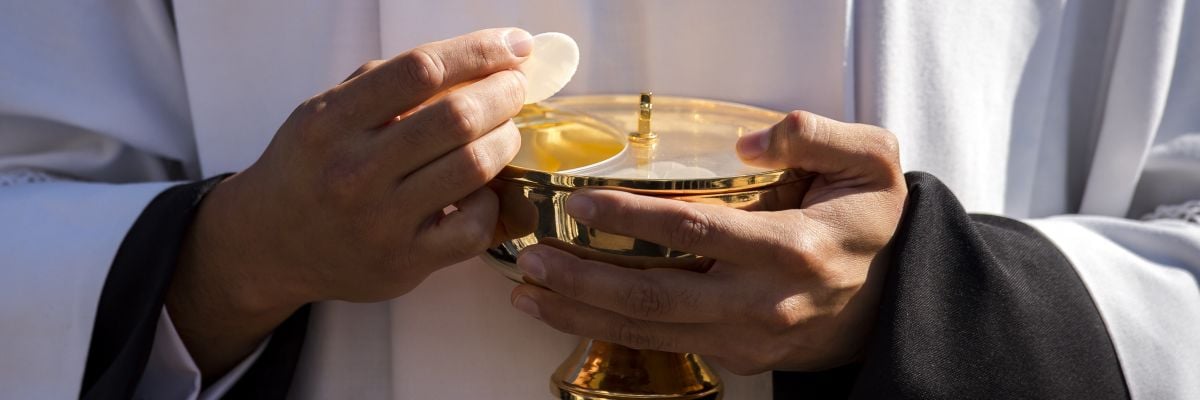
Mark Brumley gives advice to a caller in a civil marriage who is coming back to the faith and wants to know what she must do before receiving Communion.
Transcript:
Host: We go to Maria in San Jose, California, listening on Immaculate Heart Radio, Maria, what’s your question for Mark Brumley?
Caller: I’m wondering, so I was married recently, a civil marriage, I was raised in the Catholic Church and fell away from it for a really long time, and then just actually recently this year I started listening to Catholic radio, and started coming back towards my faith, now with Lent I’m trying to really participate more in the faith again. But I was wondering, is it possible, if I was to go to Confession, my husband’s not Catholic, so is it possible after going to Confession to receive Communion and the Sacraments in a civil marriage, or do I have to get my marriage blessed in the Catholic Church before I could receive the Sacraments?
Mark: Let me ask a question just out of curiosity, I don’t mean to pry: is your husband baptized?
Caller: Yes he is. He was baptized in the Presbyterian Church.
Mark: Okay, so you guys were civilly married. Alright, well, here’s what I propose. First of all, have you talked to your pastor about this?
Caller: Not really, actually. Like I said, it’s just been kind of new, coming back into the Church, and today with open forum, it was just on my heart to call in and ask this question.
Mark: Great. So Catholics, as part of the Catholic Church, the community of the Catholic Church, Catholics are required–exceptions can be made to this–but they’re required to have their marriage witnessed by a priest or a deacon, under ordinary circumstances. And this gets to the validity of the marriage from the perspective of the Church, how the Church understands marriage.
So in a situation you’re describing, it would be the case that you should consult with, certainly, your pastor about regularizing that marital situation. Your husband doesn’t have to be a Catholic in order for that to occur, but when both you and your husband are baptized, in a certain sense that makes it easier to do. So that’s what you should do, you should talk to him about, talk to your pastor, about sort of regularizing or normalizing–sometimes people say “Get it blessed by the Church,” but–that marital situation. That’s the first point.
Second point: your instinct is sound when you say “Should I go to confession,” because we want to make sure that when we go to communion, things that we’ve done, if they’ve been at odds with the teaching of Jesus, even if we’ve done them unknowingly, we knew we did did them but we didn’t really fully realize that they were wrong, we still want to make sure that how we’re living our lives, and the things that we profess and we believe, when we identify ourselves as Catholic and we want to participate in the Eucharist, which is the Sacrament that, you know, most visibly says we are fully one with the faith of the Church, we want to make sure that there’s a consistency between how we’re living and what we’re saying by receiving Communion.
And that consistency doesn’t just mean “I know I did something wrong and I’m repenting of it, I’m going to Confession.” That’s really important to do that, but even if, you know, some of our beliefs are the choices that we make in life, even if we kind of really didn’t realize that they were problematic and now we do, and maybe we weren’t blameworthy for that because we didn’t realize they were wrong, we still want to kind of come to terms with that and make sure that, you know, we are professing the faith of the Church and living the faith of the Church as disciples of Jesus as the Catholic Church understands that.
And that’s really important to sort of navigate that with your pastor, and so I would say, you know, certainly before you go to Communion, because Communion is saying, “I’m all in, Jesus,” as the Catholic Church understands “all in,” you’re going to want to make sure that that, you know, you could honestly say that, and, you know, you don’t want to…none of us wants to–we want to be people of consistency, where what we say and how we’re living is as consistent as we can be. So that’s why I would recommend talking to your pastor.
Caller: Okay perfect, thank you so much.



